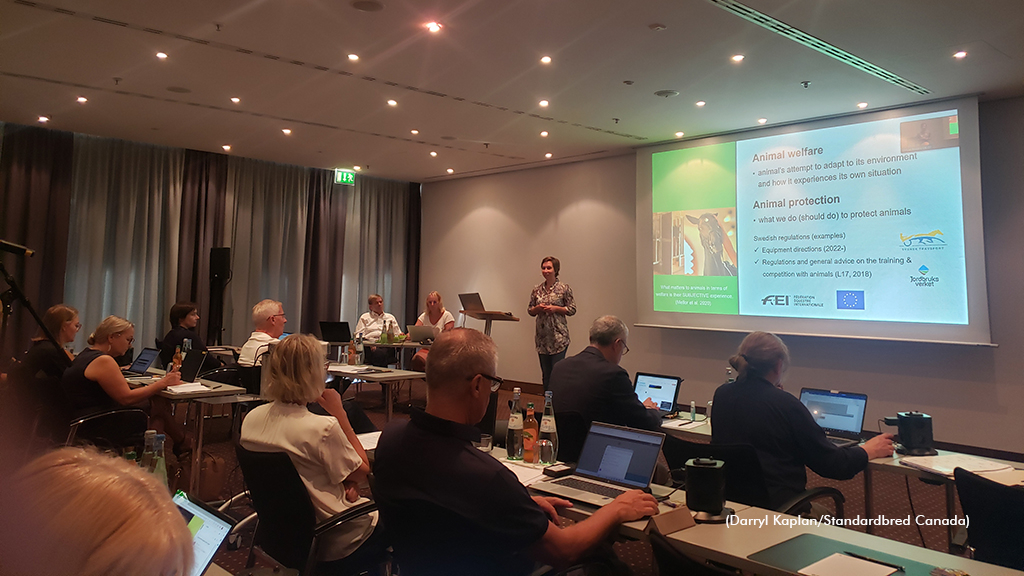
Day two of the World Trotting Conference in Berlin, Germany on Tuesday, Aug. 15 focused on various issues related to horse welfare.
Elke Hartmann, Associate Professor at the Swedish University of Agricultural Sciences, spoke on "Harness Racing through the lens of science."
Hartmann cited concerns related to mouth lesions in Standardbred horses, noting numerous studies that pointed to differing concerns. Potential areas to look at include rein tension, tight nose bands, poor dental care as well as bit thickness and equipment issues.
Specifically, in recent studies on rein tension, she said, "Pressure motivates and the removal of pressure trains" and "we can inadvertently train undesired behaviour."
In two separate studies, Hartmann and researchers measured rein tension and compared it to the perceived rein tension of drivers, also correlating speed and heart rate. The goal is to learn more about how rein tension can affect mouth lesions and other aspects of training and driving horses.
Jessica Stark, Director of Communications and Public Affairs for World Horse Welfare, spoke about the Equine Ethics and Wellbeing Commission and the "Social License to Operate."
"Social license is an unwritten 'social contract' with the public/society and an industry/organization," said Stark. "With equestrian sport, we have a very unique situation. We are more vulnerable to negative public opinion -- because it involves the use of an animal.
"The perception of poor practice in one discipline will affect those in another discipline," said Stark. "There is a lot more research now about the welfare and well-being of horses. We really would love to see the horse sport industry funding even more research.
"Establishing trust is a key element of social license to operate," she said.
In a survey of 14 countries around the world, the two primary concerns of horse sport from the public were related to horse welfare (34 per cent of respondents) and horse safety (32 per cent of respondents).
"One third of people believe welfare standards are already high, 52 per cent believe the standards need improving and 15 per cent believe they will never be adequate and it is impossible to provide adequate protection."
In a parallel survey of equestrian stakeholders and participants, only 16 per cent of respondents believed welfare standards are high vs. 78 per cent that believe standards need improving and eight per cent who believe the standards will never be adequate.
After the morning break, Jean-Marie Denoix, the Director of Cirale-Norma Direndie, spoke about the health and welfare issues surrounding Barefoot Racing. Using diagnostic testing, Ultrasonography, radiography and MRI, they researched the impact of barefoot racing vs. racing with shoes.
Horses that were unshod showed significantly more signs of sensitivity and pain versus horses that were shod. Barefoot horses also take more strides during a race than shod horses. In addition, the forelimbs show decreased symmetry than shod horses leading to a long term worsening of conformation effects.
Following the presentation, a discussion took place on whether or not barefoot racing should be limited and/or regulated in jurisdictions around the world. In Germany, two-year-olds and three-year-olds are not permitted to race barefoot.
The final panel of the day focused on the Situation in North America. John Campbell spoke about horse welfare in the United States, whipping rules and regulations, drug testing, federal regulations in the United States and caring for horses from birth to death.
"Society has changed and there is no room for one-handed whipping in harness racing today," said Campbell, who also spoke extensively about the social license as "something we should all be concerned about."
Campbell said that the World Trotting Conference in 2017 in Prince Edward Island was a significant catalyst towards the change in the industry in the United States related to whipping as the reaction to the 2017 Hambletonian from delegates around the world was significant.
Racetrack and horse owner Jeff Gural spoke about drugs in racing and the concerns he has: "We have a real problem. The situation is not good in America and it is likely to get worse." Gural encourages harness racing in the U.S. to be a part of HISA, the Horse Racing Safety and Integrity Authority.
Joe Faraldo, President of the Standardbred horseperson's group in New York, and Chairman of the United States Trotting Association, also spoke: "Performance enhancing drugs, there is a difficulty testing for them. The only solution to this problem is not increased testing... The only way to finish this problem is with boots on the ground.
"HISA is problematic because rules in Thoroughbred racing don't necessarily apply to us," said Faraldo. "When you keep talking negatively about this sport, you are going to kill it."

